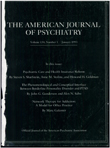Drug abuse in schizophrenic patients: clinical correlates and reasons for use
Abstract
OBJECTIVE: This study aimed to 1) determine substance abuse prevalence and preference in a diverse sample of schizophrenic, schizoaffective, and schizophreniform inpatients, 2) compare drug-abusing and non-drug- abusing patients on demographic and clinical variables during the acute and stabilization phases of their hospital course, and 3) obtain data from patients on reasons for drug abuse and on acute state-related changes during periods of intoxication. METHOD: Eighty-three psychotic inpatients consecutively admitted to a New York City teaching hospital were evaluated. Sixty-eight had schizophrenia, 12 had schizoaffective disorder, and three had schizophreniform disorder diagnosed according to the Structured Clinical Interview for DSM-III-R. Each patient received ratings on the Brief Psychiatric Rating Scale, the Global Assessment Scale, and the Scale for the Assessment of Negative Symptoms at admission and at discharge, an evaluation of premorbid adjustment, and an extensive interview on drug and alcohol use. RESULTS: Forty (48%) of the patients received diagnoses of drug or alcohol abuse or dependence. The drug-abusing patients primarily used cannabis (N = 26), alcohol (N = 21), and cocaine (N = 14) and reported that they abused drugs to get "high," to relieve depression, and to relax. They had significantly fewer positive and negative symptoms at discharge, better sexual adjustment and worse school performance during adolescence, and more family histories of drug abuse than the non-drug-abusing patients. CONCLUSIONS: Schizophrenic patients who abuse drugs may represent a subgroup of patients with better prognoses and less severe clinical characteristics of schizophrenia, but their drug abuse may adversely affect global outcome.
Access content
To read the fulltext, please use one of the options below to sign in or purchase access.- Personal login
- Institutional Login
- Sign in via OpenAthens
- Register for access
-
Please login/register if you wish to pair your device and check access availability.
Not a subscriber?
PsychiatryOnline subscription options offer access to the DSM-5 library, books, journals, CME, and patient resources. This all-in-one virtual library provides psychiatrists and mental health professionals with key resources for diagnosis, treatment, research, and professional development.
Need more help? PsychiatryOnline Customer Service may be reached by emailing [email protected] or by calling 800-368-5777 (in the U.S.) or 703-907-7322 (outside the U.S.).



